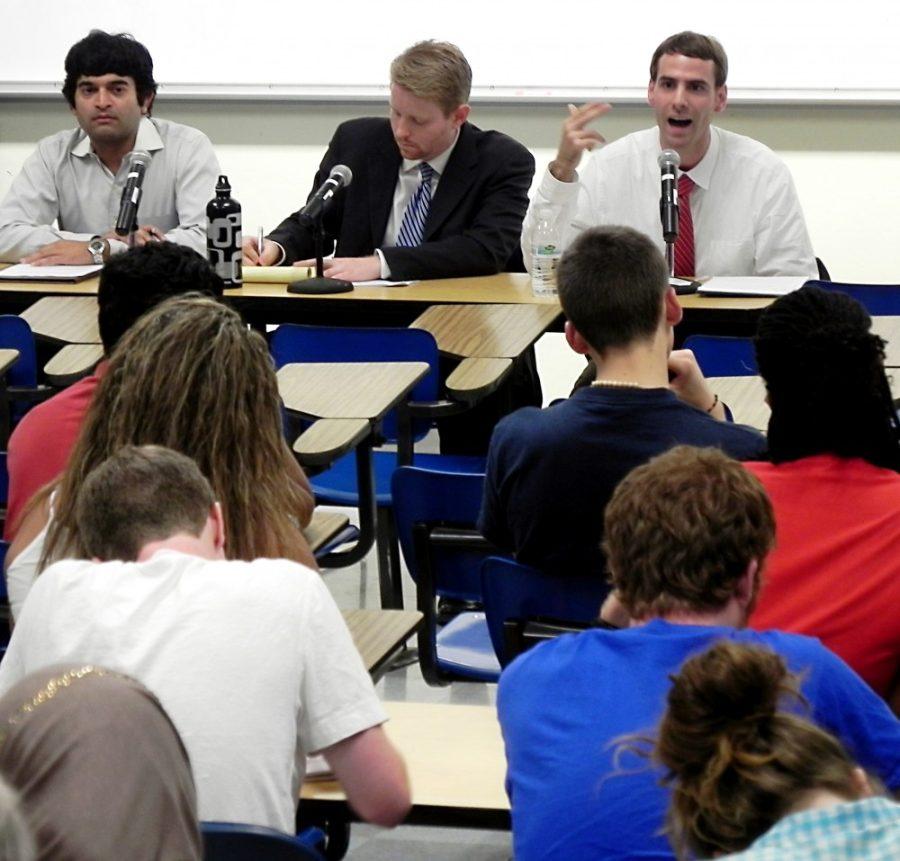A panel of UA graduate students and faculty analyzed key factors that will determine the outcome of revolutions in Syria and Libya and how these factors are currently shaping the conflicts.
Approximately 65 students, community members and academics attended “Anatomy of a Tipping Point: Opposition Movements, Intervention and the Military in the Arab Fall.” The discussion was hosted in the Modern Languages building on Friday by the Southwest Initiative for the Study of Middle East Conflicts and the School of Middle Eastern and North African Studies. “Arab Fall” is a term used for the uprisings, and relates to the “Arab Spring” revolutions in countries such as Egypt and Tunisia, among others.
The panel addressed topics such as the role of violence, the impact of foreign intervention, the influence of minorities and opposition groups and the involvement of the military in each country.
Dylan Baun, Matt Flannes, Johann Chacko and Ahmed Meiloud, all graduate students who have studied or are studying the Middle East, offered analysis of these issues in four 10-minute presentations, with the hope that the event would shed light on the opportunities and obstacles of the latest Arab revolutions.
Foreign intervention, specifically by the United States, was one of the most prominent subjects addressed by both the panel and the audience. In his presentation, Flannes highlighted the differences between the administration of President Barack Obama and that of former President George W. Bush. Flannes said Obama is leading from behind, letting the indigenous population drive the revolt, instead of taking what he called the Bush administration’s “strike before being struck” approach. Though this argument faced challenges from some audience members, Flannes said he was not condoning or condemning U.S. foreign policy, simply presenting the relative differences between the strategies of the two presidents.
“The West is very eager to intervene,” added Meiloud, “so that they can shape these post-regimes.” But regardless of how they are currently involved, he said, Western powers will have to accept that the emerging governments will serve their own agendas.
In the question and answer session that followed, Leila Hudson, panel chair and an associate professor in the School of Middle Eastern and North African Studies, emphasized that the Arab Fall is unpredictable.
“There are more questions than answers coming out of all of this,” she said. The audience raised myriad concerns, from whether or not the unrest will spill over into Lebanon, to how the U.S. will involve itself in Yemen, to the fate of Bahrain, to the connotation of the term “Arab Fall.” When asked how the uprisings will affect the Western world, members of the panel said they hope the revolutions will challenge the deep-seated stereotypes many Europeans and Americans maintain about the Arab world. Meiloud said he is optimistic because, due to increased media coverage, “people’s knowledge of the region is remarkably better.”
Once the panel had concluded, the conversation continued beyond the classroom. Tia Maitra, a graduate student in the Department of Speech, Language and Hearing Sciences, said she attended the discussion in order to increase her knowledge of the Arab revolutions. She said she has been following the events of the past nine months and is curious to see how it all will end. As the panel noted earlier, the outcome of the Arab Fall is uncertain, more uncertain than that of the Arab Spring, and bound to change at any moment.
“Nobody really knows for sure,” Maitra said, “we are kind of waiting with bated breath.”









